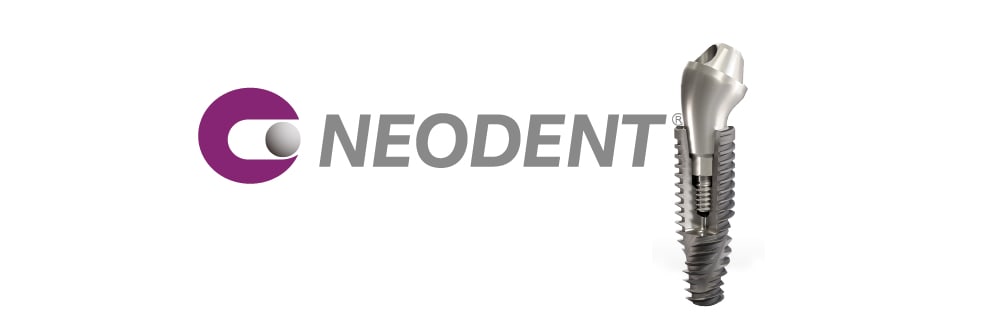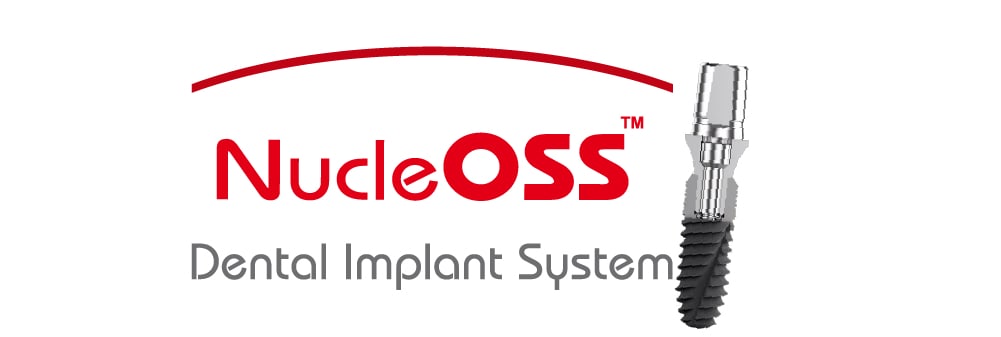The given timeframes are approximate. The surgeon will decide on a precise plan based on an individualized assessment.
Table of Contents
- What is a Dental Implant?
- Who Can Have Dental Implants ?
- Implant Scenarios
- Additional Procedures to Ensure Implant Success
- Benefits of Dental Implants
- How is the Dental Implant Procedure Performed?
- Treatment Itinerary for Dental Implants
- Post-Procedure Aftercare and Possible Complications
- Brands and Options for Dental Implants
What is a Dental Implant?
A dental implant serves as a durable replacement for a missing natural tooth root. Crafted from biocompatible titanium, this small screw-like structure securely fuses with the jawbone, providing a stable foundation for the replacement tooth.
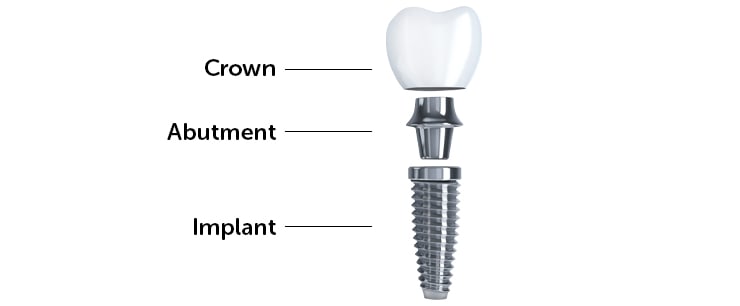
Who Can Have Dental Implants ?
Dental implants are a popular and effective solution for replacing missing teeth. While the eligibility for dental implants can vary based on individual factors, in general, many people can be considered candidates for dental implants. Here are some key considerations:
Sufficient Bone Density: Adequate bone density in the jaw is crucial for the successful placement of dental implants. If a person has experienced bone loss, bone grafting procedures may be necessary to augment the bone before implant placement.
Good Oral Health: Candidates should have good oral hygiene and overall oral health. Conditions such as gum disease (periodontal disease) should be treated before considering dental implants.
Overall Health: Generally, candidates for dental implants should be in good overall health. Chronic medical conditions such as uncontrolled diabetes or autoimmune disorders may affect the success of implant surgery.
Age: Age is not necessarily a limiting factor, but the jawbones of children are still developing, so dental implants are usually not recommended until growth is complete. Otherwise, age itself is not a strict determinant.
Commitment to Oral Hygiene: Candidates should be committed to maintaining good oral hygiene practices after the implant procedure. Regular dental check-ups and proper oral care are essential for the longevity of dental implants.
Non-Smokers: Smoking can negatively impact the success of dental implant surgery. It can increase the risk of complications and slow down the healing process. Dentists often advise patients to quit smoking before undergoing implant procedures.
Absence of Certain Medical Conditions: Some medical conditions or medications may affect the healing process. It's important to discuss your medical history with your dental implant provider to assess your candidacy.
It's crucial to consult with a dental professional, typically an oral surgeon or a periodontist, to determine if you are a suitable candidate for dental implants. They will evaluate your oral health, medical history, and other factors to provide personalized advice based on your specific situation. Keep in mind that advancements in dental implant technology and techniques continue to expand the pool of eligible candidates.
Factors Affecting Dental Implant Success
While dental implants have a high success rate, certain factors can influence their long-term effectiveness. Good overall health plays a crucial role, although having health issues doesn't necessarily rule out implant candidacy. However, success rates tend to be lower in smokers, and conditions like diabetes can impact healing time.
Caring for Dental Implants
To ensure the longevity of dental implants, proper care is essential. Similar to natural teeth, diligent oral hygiene practices and regular visits to the dentist are necessary to maintain their health and functionality.
Implant Scenarios
Dental implants offer versatile solutions for various tooth loss situations, including:
1. Single Tooth Replacement with Dental Implant:
Unlike traditional bridges, dental implants don't require crowning adjacent teeth, providing a more conservative approach.
2. Multiple Teeth Replacement with Dental Implants:
An implant bridge offers a seamless solution for replacing multiple missing teeth without affecting neighboring teeth.
3. Full Mouth Reconstruction:
There are two primary options: conventional implants with zirconium crowns or all-on system implants with a click system acrylic cast denture.
Option 1 (All On Six Dental Implants)
A full set of implants, in which up to 8 implants are placed in the upper jaw and at least 6 implants in the lower jaw, is a successful treatment method in modern dentistry. In this special procedure, high-quality zirconium crowns are integrated into the patient's upper and lower jaws.
Option 2 (All On Four Dental Implants)
The placement of four implants in the upper and lower jaw is an effective treatment method widely practiced in modern dentistry. In this specialized procedure, the implants are meticulously placed and then a click-fit cast acrylic denture is used.
Additional Procedures to Ensure Implant Success
In some cases, additional procedures may be necessary to optimize implant placement:
Bone Augmentation:
When jawbone resorption occurs due to long-term tooth loss, bone augmentation involves inserting synthetic bone to create a solid foundation for successful implant placement.
Sinus Lifting:
Insufficient upper jawbone may require sinus lifting, where the sinus membrane is elevated to make room for additional bone to support the implant.
Benefits of Dental Implants
Dental implants offer numerous advantages that enhance both aesthetics and functionality:
- Natural Look and Feel: Dental implants closely resemble natural teeth, providing a seamless smile.
- Improved Confidence: By restoring a complete smile, dental implants help individuals regain their self-assurance.
- Easy Maintenance: Implants can be cared for just like natural teeth, with regular brushing and flossing.
- Stability and Comfort: Unlike removable dentures, implants offer a stable and comfortable fit.
- Durability and Biocompatibility: Implants made from durable and biocompatible materials, such as titanium, minimize the risk of damage or allergic reactions.
- Preservation of Adjacent Teeth: Unlike traditional bridges, implants don't rely on neighboring teeth for support, protecting their integrity.
- Long-Term Effectiveness: With proper maintenance, dental implants can last a lifetime, offering a long-term tooth replacement solution.
How is the Dental Implant Procedure Performed?
Before the Procedure
Prior to the procedure, your dentist and oral surgeon will conduct a comprehensive oral examination. In addition, an OPG (panoramic x-ray) or CT scan of the patient will be assessed during the consultation. These imaging techniques are employed to analyze the bone density at the intended implant site(s). The procedure typically requires local anesthesia, with the only discomfort being the initial prick of the anesthesia needle and a sensation of pressure.
Ensure to maintain your regular eating and fluid intake (non-alcoholic) before the procedure. Do not skip breakfast, and adhere to your usual medication schedule.
During the Procedure
Phase 1
After confirming the health of your jawbone for implant placement, your dentist will proceed by opening the gum tissue. Using a specialized drill under local anesthesia, a channel is then carefully created deep into the bone for the implant placement.
Based on the bone density and anatomical structure, your dentist will select the type and length of the implant. Subsequently, the implant is positioned within the channel, and the gum is either sutured or stitched back. In certain instances, your dentist may opt not to close the gum immediately and instead place an abutment directly onto the implant.
If you are currently using a denture, it will be maintained throughout the healing process. Alternatively, a temporary prosthesis may be introduced. Adjustments to improve the fit of existing dentures can be made as necessary.
Typically, the healing period spans from 3 to 6 months. Throughout this time, the implant undergoes osseointegration, establishing a robust structural connection between the titanium implant and your natural jawbone, mimicking the function of a natural tooth root. Once successful osseointegration is achieved, the process advances to the next phase.
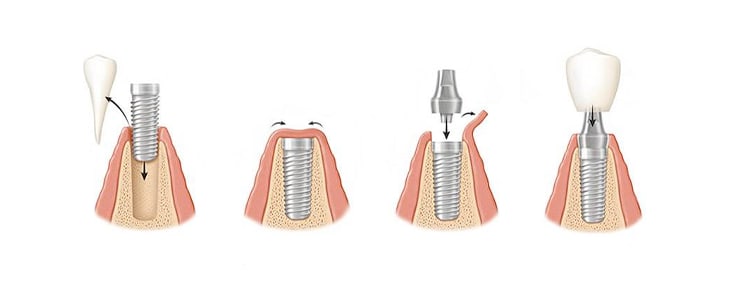
Phase 2
The gum is reopened to reveal the implant, and a specialized dental instrument is employed to screw and secure the abutment onto the dental implant. Following this step, a temporary crown is affixed onto the abutment to safeguard it from biting forces, ensuring a successful healing process. The temporary crown remains in place for a few days until the permanent crown is prepared.
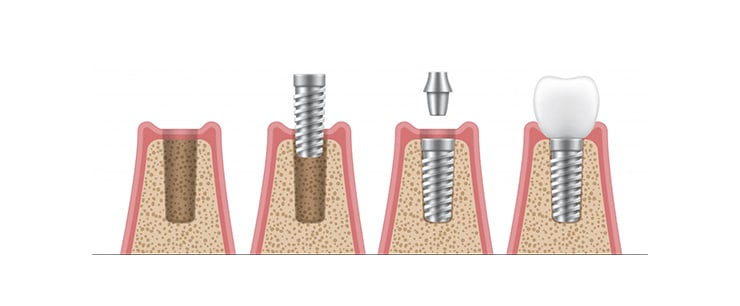
After the Procedure
After-care
- Refrain from consuming hot beverages or food on the first day.
- Wait until the local anesthetic wears off before eating.
- Avoid touching or rubbing the treated area with your fingers or tongue.
- Minimize the use of your denture if it covers the implant site, especially during the initial recovery period. If your denture feels uncomfortable post-surgery, promptly seek adjustments to prevent potential harm to the healing implant.
- The stitches used are typically dissolvable and may take 2-3 weeks to naturally dissolve.
- Steer clear of excessive exercise for the first 48 hours following surgery.
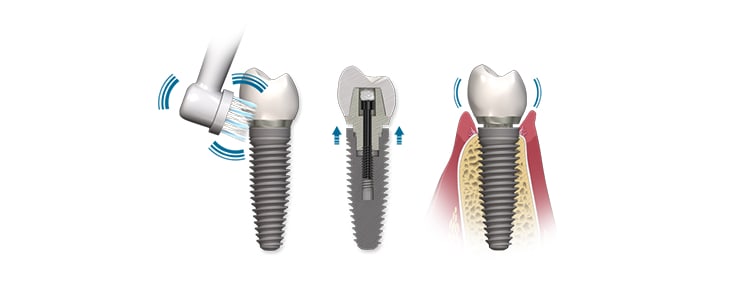
Treatment Itinerary for Dental Implants
The dental implant treatment typically involves two visits to complete the procedure, with a healing period between them. The itinerary may vary depending on individual cases:
- First Visit: Surgical insertion of dental implants. This visit may require 1-3 appointments over one week.
- Healing Period: During this period of 3 to 6 months, the implants integrate with the jawbone.
- Second Visit: Placement of prosthesis over the implants. The duration and number of appointments depend on the type of prosthesis chosen.
It's important to note that these timelines are approximate and subject to individual circumstances.
Post-Procedure Aftercare and Possible Complications
After the dental implant procedure, proper aftercare is crucial to ensure successful healing and minimize potential complications. Patients should follow post-surgery guidelines, which may include:
- Avoiding hot food and drinks for the first day.
- Refraining from eating until the local anesthesia wears off.
- Minimizing contact with the implant area by not touching or rubbing it.
- Wearing dentures as little as possible during the healing process.
- Following any prescribed medications, including antibiotics, to prevent infection.
- Managing swelling with ice packs and taking breaks between applications.
- Applying pressure with dampened gauze if there is persistent bleeding.
- Temporarily refraining from smoking to reduce the risk of implant failure.
- Reporting any worsening pain or complications to the dentist for evaluation.
- Adhering to oral hygiene practices, including gentle brushing and flossing.
While complications are rare, patients should be aware of potential issues, such as moderate pain, swelling, bruising, and sensitivity. Following the dentist's instructions and attending follow-up appointments can help address these concerns effectively.
Brands and Options for Dental Implants
Various dental implant brands and systems are available, and your dentist will recommend the most suitable option based on your specific needs and preferences. Some well-known brands include Straumann, Nobel Biocare, and Zimmer Biomet.
Frequently Asked Questions (FAQs)
How long do dental implants last?
With proper care and maintenance, dental implants can last a lifetime. Regular dental check-ups, good oral hygiene practices, and avoiding habits like smoking can contribute to the longevity of dental implants.
Is the dental implant procedure painful?
The dental implant procedure is typically performed under local anesthesia, so patients should not feel pain during the surgery. Post-surgery discomfort can be managed with prescribed medications, and most patients report minimal pain during the recovery period.
What is the success rate of dental implants?
Dental implants have a high success rate, generally ranging from 95% to 98%. Success depends on various factors, including the patient's overall health, oral hygiene, and the skill of the dental professional performing the procedure.
How long does it take to complete the dental implant process?
The entire dental implant process can take several months. It includes the initial consultation, implant placement surgery, a healing period known as osseointegration (when the implant fuses with the jawbone), and the placement of the final restoration (crown, bridge, or denture).
Are dental implants suitable for everyone?
While dental implants are a viable option for many individuals, not everyone is a suitable candidate. Factors such as overall health, jawbone density, and oral hygiene play a role. A thorough evaluation by a dental professional is necessary to determine eligibility.
How do I care for my dental implants?
Caring for dental implants involves regular brushing, flossing, and routine dental check-ups, similar to natural teeth. Avoiding harmful habits like smoking and maintaining a healthy lifestyle contribute to the long-term success of dental implants.
Can dental implants be used to replace multiple missing teeth?
Yes, dental implants can be used to replace a single tooth, multiple teeth, or even a full arch of teeth. Various implant-supported prosthetics, such as bridges or dentures, can be customized to meet individual needs.
What is the recovery process like?
Our esteemed organization serves as a facilitator between patients and doctors, ensuring a seamless recovery process through comprehensive pre-operative and post-operative care guidance. Our dedicated team works closely with qualified doctors to guarantee optimal outcomes and a smooth transition towards a successful recovery.
What are some possible complications after having dental implant treatment?
Complications
- Mild discomfort is expected in the days following surgery, and it can be effectively managed with prescribed painkillers. If the pain intensifies instead of improving after 3-4 days, it's advisable to schedule an appointment with your dentist.
- Utilize the antibiotics prescribed by your dentist to prevent the risk of infection, ensuring that you complete the entire course.
- Swelling is a normal postoperative occurrence, potentially more pronounced in the morning after lying flat overnight. Ice packs can help reduce swelling; apply them to the cheek for 10-minute intervals with 15-minute breaks. Typically, swelling subsides within 48 hours.
- Bruising may occur but usually resolves within a few days.
- Some bleeding is normal after surgery. If it persists, apply pressure with a dampened gauze for up to 30 minutes.
- It's crucial to abstain from smoking for a minimum of two months after implant placement, as smoking significantly increases the risk of failure.
- Following the placement of the crown or denture, there may be some sensitivity. Painkillers can be taken to address this, with the expectation that the sensitivity should diminish after 2-3 days.
 English
English









